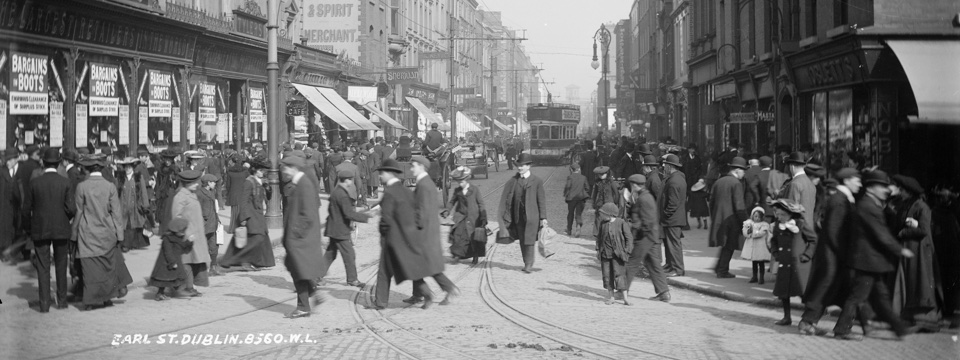
Accents
Accents
QR Link
Preparation
Transcript
José Cruz: Professor Shane Doyle.
Shane Doyle: Yes.
José: Thank you very much for uh, giving us the time today. (No problem) You’re Irish.
Shane: I am, yes. That’s right.
José: OK to be honest with you, when I first started talking to you, I couldn’t quite tell.
Shane: Why was that now'Now' placed at the end of any statement or question add emphasis. (0:12)?
José: I know you’ll probably be offended, but I have a hard time at first discerning Irish accents from Scottish accents. (Oh no) See I told you! I told you!
Shane: Well, they’re- They are totally different. Uh but maybe not to the North American ear.
José: That’s exactly what I was about to say. I I’m sure that especially because the Irish and the Welsh, and the English and and the Scottish and everybody else have such a long, what? thousands of years of history between them and animosity between them that there’s a lot of difference But I think for a lot of people even North Americans, to us it’s all Britain. (Yes yes) And and that’s- I’m sure that’s offensive to you, isn’t it?
Shane: Well it’s not offensive really. You know, uh when you’re younger you take offence perhaps you know, but when you get a bit older you mellow out a little bit and you can understand why perhaps people think like that you know.
José: But it- does it does it- I wanna sayJosé says this very quickly and almost inaudibly. (1:06)– maybe “offence” is too strong a word but it does kind of bother you, “Why can’t you understand? I’m not Scottish. I’m not English.”
Shane: Mm. you have to- you have to give people some leeway also you know. The other side of the coin is that when I listen to an American and a Canadian speak, sometimes I have difficulty uh determining like, which is which you know.
José: Oh that’s OK, Americans can’t tell Canadians are Canadians until we tell them we’re Canadians.
Shane: That’s right yeah. Mm, but again the Canadians seem take great offence at being called Americans.
José: Oh we hate that. (Yes) But we do understand why they can’t tell our accents. (Mm) Uh because if you ever talk to somebody from say, Minnesota or for say, Minnesota or say upstate New York up towards like where there aren’t- there are more Canadians than there are Americans (Right) those Americans talk an awful lot like Canadians (Like Canadians, yeah) Right.
Shane: Yeah. But it’s only once you’ve met Canadians and Americans for quite a bit which you tend to do here in in Japan, right? Is when when you’re able to determine like who’s Canadian and who’s not Canadian; like who’s American and who’s not American
José: Were you able to determine that about me when you first saw me? (No) Really? (Yeah) So you you you- So for the longest time you thought I was American?
Shane: Well I assumed you were either, sorryShane apologises to indicate he is starting over what he is saying. (2:22) I assumed you were either Canadian or American, you know (OK OK) I didn’t really make any distinction as such then-
José: Do you- do you know what I am then? (Well, you’re Canadian) OK good. OK good. Good. (You just told me) Just checking. Just checking. I’m just checking (You just told me today) I can’t- Until I told you, which way were you leaning, until I told you?
Shane: I would- I would have leaned towards American. Because you seem to have a softer, you seem to have a softer uh accent, you know (Ahh) when you compare it to Canadians who are perhaps just off the boat, you know. Uh they- They’re more like “ehCanadians are famous for their tendency to often place, 'eh' at the ends of their statements or questions. (2:55)” isn’t it? Isn’t it, “eh” and that kind of
José: I don’t know if it’s because Canada is more multi-cultural country and we have it at the forefront of our minds to be multicultural, and I don’t know if it has anything to do with my background being Pilipino, being born Pilipino and Pilipinos are naturally multi-linguistic but I find, and I think even Alex Bodnar another Canadian and Andrew Zitzman another Canadian, when we talk among Canadians our accents come back, and when we talk among non-Canadians we talk in a completely neutral way and we don’t say “eh” (Hmm) But especially when me, Mike Berg and Alex Bodnar are sitting around watching hockey, we start swearing like Canadians and we all start saying “eh! eh!”
Shane: But you do find that, like I mean if I go to Ireland for a couple of weeks, my accent would become much stronger (Really) you know. And then if I came back to Japan like people will say “Ah I know you’ve been back to Ireland because your accent is- has be- has become stronger”. And it does do that because you go home and you’re surrounded by people who- who you understand easily and you fall back into the idea (Sure) of speaking like everyone else, you know.
Consolidation
QR Link
Access this article on your mobile device

Accents
Speakers

José Domingo Cruz
Canadian
Vancouver, British Columbia

Shane Doyle
Irish
Dublin, Ireland
Statistics
- words (including pause words)
- minutes in the mp3 audio
- words per minute for this article
Continue practicing your English fluency with the related posts above, or navigate to other authentic conversations using the Previous and Next buttons below.
Spritz
To spritz only part of this conversation, highlight the text you want and click the “SPRITZ NOW!” button. Clicking the button without any text highlighted will spritz the entire page.
To quickly adjust the words per minute (wpm), you can use the left and right arrow keys.
Writing comments will help your English writing skills. Feel free to ask questions and share opinions. We try to respond to all comments we get on the site. test





I like to use the phone than paper,because I lost my dictionary.And it’s really difficult to speak louder when I do shadow talking.
I felt difficult to do shadow talking. I can’t speek same speed.
I like to use this web site in iPhone. Dictionary system is useful for me. I’d like to do this way.
Using cellphone is easire than using a paper. But sometines ,I want to write a note near the sentenc.so,I think we need a parer